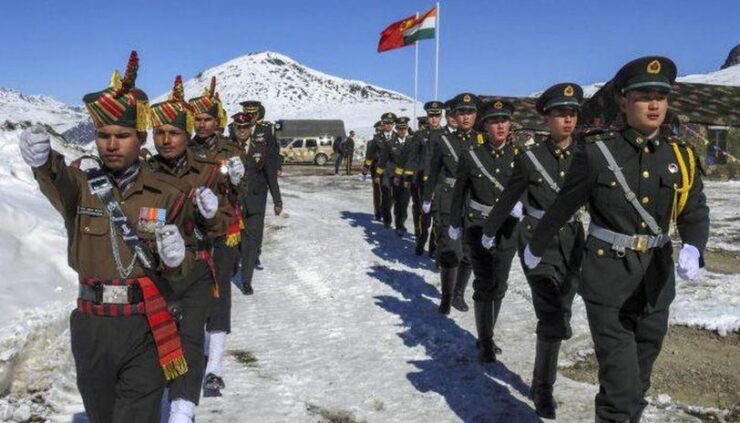The standoff at the Ladakh border between India and China which was triggered in March last year and the subsequent dialing down of tensions and war mongering rhetoric has highlighted the effectiveness of the eye for an eye approach of the Indian strategic establishment. The recent complete withdrawal of Chinese troops from the north and south bank of Pangong Tso in Ladakh has demonstrated to the world India’s resilience to look into the eyes of the powerful Chinese dragon and make the latter blink first. The Chinese regime has learnt that trying to browbeat one’s adversaries into submission using military, economic and other means doesn’t always work, least of all in the case of India. This episode has also highlighted the need for other nation states who are reeling under Chinese military pressure to use a leaflet out of the Indian diplomatic and military book to combat the PLA menace.
A metaphor for the Indo Pacific
The Chinese disengagement has some important ramifications for India’s Indo Pacific and Indian Ocean strategy. At a time when India and its Quad allies are busy giving an institutional shape to the security grouping, China is using all tools at its disposal to bolster its influence in the Indo Pacific and Indian Ocean Region (IOR). The Indian Ocean Region is one of the economically and strategically important and diverse regions in the world, holding close to 20 per cent of the global hydrocarbon reserves and over 40 per cent of maritime trade passing through this region. While in the last few years India has through soft power means has enhanced its influence in the region, China is not backing down. China is using raw hard power to increase its influence.
The fact that Myanmar and Sri Lanka are vital components in the maritime part of the Belt and Road Initiative (BRI) highlights the importance that China attaches to the Indian Ocean Region (IOR). But while the IOR is India’s backyard, the Indo-Pacific despite being a recent geographical coinage enjoys immense importance for China and the Quad. Alfred Mahan, the great American strategist, had strongly pitched for the importance of sea power arguing that control of the seas is the key towards building an empire.
Since China has faced a humiliation from India on land, it will try and avenge that through the sea, China as a part of its assertive diplomacy will try and offer poor and middle income African countries generous loans as a part of its famed debt trap diplomacy. It will also entice and coax the countries into building military bases to encircle India as a part of the maritime silk route strategy. It can activate its vast war propaganda machinery to threaten India. India needs to be cautious.
Time to up the ante
The time for India is ripe, at a time when the confidence of China has hit rock bottom, India must bolster its presence in the Indo Pacific region, and some strategies that India can use would be-
Firstly, giving the Quad a formal shape by institutionalising it through a NATO style charter of commitments and rights. The Quad must establish itself not only as a military alliance but also become an alliance of global democracies with India at the helm. It must also expand its ambit by including other countries like South Korea, Taiwan, Vietnam etc. to strengthen its core.

Secondly, India must let go off its cold war era mentality of not interfering in the internal affairs of other countries, when nations like China, Pakistan etc. routinely violate their own implicit commitment of discussing matters internal to India, then India must too not keep its own end of the bargain, in fact India must actively pursue the cause of human rights violation in Xinjiang province of China, must provide strong backing to Taiwan to defend itself against the irredentist claims of China inter alia.
Thirdly, the Covid-19 pandemic has demonstrated how the over reliance on the supply chain of China can cause havoc in the world, in that context India must stitch alternative supply chain alliances with other nation states to reduce the dependence on China. The Resilient Supply Chain Initiative (RSCI) is a case in point.
Fourthly, there must be a tougher scrutiny on Chinese economic investments. Its soft power influence through cultural programmes, people to people interactions must be brought under the scanner to curb any chance of nefarious activities to undermine India’s sovereignty.
Conclusion
Carl Von Clausewitz, a prominent Prussian general and military strategist said “Pursue one great decisive aim with force and determination.” India must not let go off this opportunity to outwit China in its influence, the mandarins of Indian foreign policy must utilise it to enhance India’s prowess vis-à-vis China.
-The writer is currently working as a Trainee Research Associate at Defence Research and Studies (dras.in) and is a columnist. The views expressed are personal and do not necessarily reflect the views of Raksha Anirveda
–The writer is currently working as a Research Associate at Defence Research and Studies (dras.in) and is a columnist. The views expressed are personal and do not necessarily reflect the views of Raksha Anirveda










